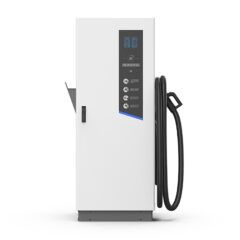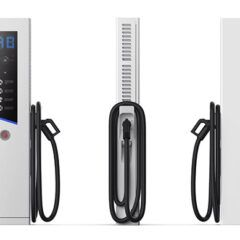How to use e car charging station like a pro?
An electric car with a large lithium battery pack can generate 400-800V of power. It is still indispensable for a conventional 12V lead-acid battery as in an internal combustion engine vehicle. Today’s pure electric car is easy to link to an e car charging station. It can reverse the electricity for domestic purposes.

For example, an F-150 Lightning with a fully charged extended battery pack can power an entire house for up to 3 days, based on an average daily consumption of 30kWh.
So why do electric cars with such a large power storage source still need the help of a small, independent battery?
There are 2 main reasons as follows:
12V battery helps maintain electrical equipment on the vehicle
Most electric cars today maintain a 12V battery (usually lead-acid type), stemming from the practice of pioneering Tesla.
Tesla started with the Roadster convertible electric sports car launched in 2008. When using it again, the owner of the car could not unlock, could not start and could not do anything else by calling for help.
12V battery on the electric
All this unnecessary expense is easy to save if this Tesla comes with a 12V battery that usually costs a few hundred dollars.
E car charging station will help maintain common electrical equipment in a car, especially powering computers and other important electronic devices. After the above incident, Tesla changed the design and used more 12V batteries for later products. Many automakers have absorbed Tesla’s experience to arrange an additional 12V battery position on electric cars.
Besides, in the event of an accident or damage, a 12V battery will help maintain electrical equipment such as emergency lights, lighting, communication systems,… by now. The computer has automatically turned off the main battery power to prevent a possible fire.
Cost savings with e car charging station
If you compare the prices, it is clear that a 12V lead acid battery will be cheaper than a lithium battery of the same voltage. Meanwhile, the advantage of lead-acid batteries is that they are more durable in harsh environments, especially in cold climates.
According to the researchers, Lithium-ion batteries can discharge from -20⁰C to 60⁰C, but can only be recharged if their temperature is above 0⁰C. Furthermore, Lithium-ion batteries perform best if the operating temperature is between 15⁰C and 35⁰C. Therefore, if using a 12V Lithium-ion battery, it will be easily damaged when the temperature drops below freezing.
In contrast, lead-acid batteries do not freeze until -90⁰F, can charge and discharge over a wide temperature range without failure.
How does e car charging station can help?
In the process of developing electric cars, many car manufacturers have considered upgrading the e car charging station. However, the reality is that the auto industry now standardizes 3rd party components such as:
- Airbags
- Lights
- wiper motors
- power windows
- power liftgate
- mirrors, fans,
- power steering, etc. Power brakes, A/C, etc. operate on 12V
Replacing other voltages is costly and unnecessary.
It can be said that one of the most confusing things for many customers. They have been using electric vehicles (EVs) is the difference between charging ports. Unlike traditional internal combustion engine cars, which use the same fuel injectors to receive energy?
Electric cars have at least 5 types of electrical sockets corresponding to different manufacturers. Therefore, the following e car charging station guide and explanation will probably be helpful to customers. It is for them who own and learn about electric vehicles.
Types of charger plugs for electric cars
This 5-pin plug-type connector was widely common in North America, but has been largely replaced in the UK and European markets by type 2. That means, you’ll still find it on some older EV models, such as first-generation versions of the Nissan Leaf and Kia Soul EV…
Type 2 . plug

By far the most popular plug in Europe, the 2 (7-pin) types is sometimes referred to as Mennekes in the sense of the German connector design company. Recent EU legislation “implicitly” requires new car manufacturers to include the 7-pin plug as standard with their electric vehicle models. It means that almost all public charging points will have Type 2 plug.
Like type 1, this system is only designed to work with slow and fast charging. However, it can also handle 22kW of power provided by a three-phase power supply. You will need to check if your vehicle can accept this level of power.
What vehicles e car charging station can support?
The latest e car charging station can also cope well with up to 43kW of power at one of the rare AC fast charging makeovers. The Tesla Model S and Model X use a modified Type 2 charging port that allows them to charge.
Unlike type 1 charging port, type 2 is easy to lock to the car. This ensures no one can disconnect the car while it is charging and away from the car.
Combination Plug (Combined Charging System, or CCS)
Combined system, or CCS as commonly known as the most common connector for fast charging DC (Direct Current). Most new pure EV models come with this type of outlet. This essentially allows you to both charge at a public DC fast charger and a home AC charger. This is also the system that Tesla has started to apply in Europe and became the standard system on the Model 3.
The Charging Ports of e car charging station
The e car charging station is a combination of a heavy duty 2-pin DC receptacle and a Type 2 7-pin (CCS Combo 2) or 5-pin Type 1 socket, with a DC connector located underneath these AC plugs. When you want to top up your battery at a fast charging station, just plug the CCS connector into your car.
Depending on the charger and vehicle type, you can receive up to 350kW of power. Although the CCS plug connects to both car charger sockets, it’s only the bottom 2-pin element used to transfer power to the battery. While you are charging at home, just use the Type 2 plug for the top half of the outlet.

